It's hard work for a haulier to survive in a
Page 49
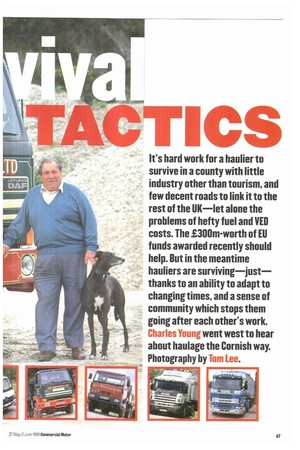
Page 50
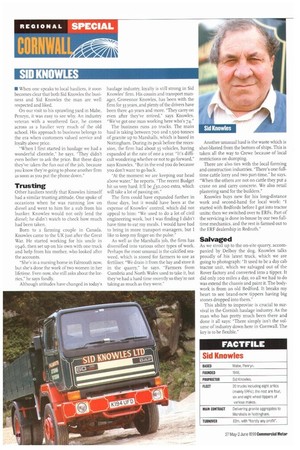
Page 51
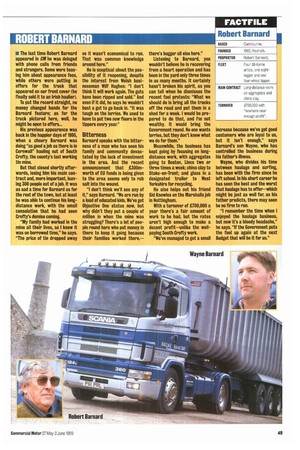
Page 52
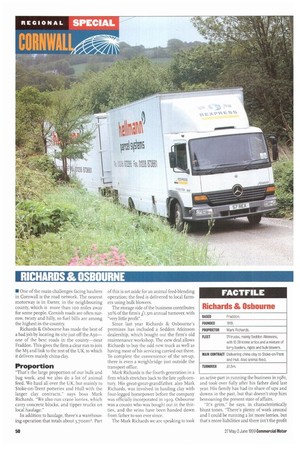
Page 53
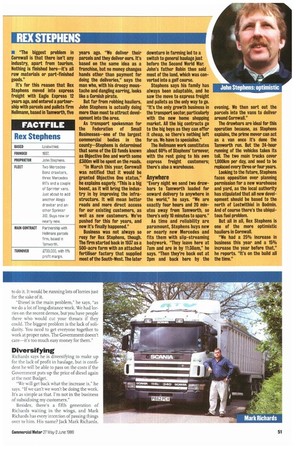
Page 54
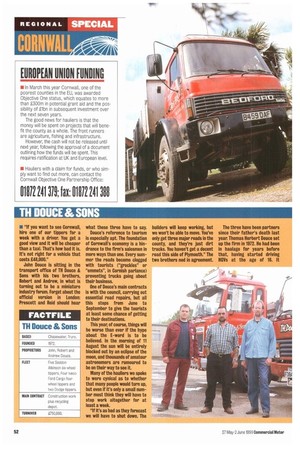
Page 55
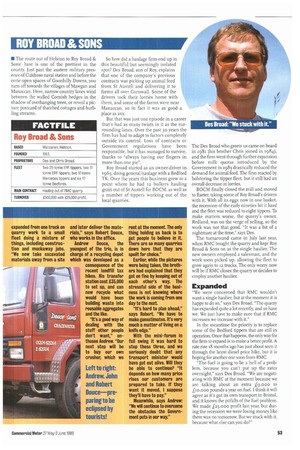
If you've noticed an error in this article please click here to report it so we can fix it.
county with little industry other than tourism, and few decent roads to link it to the rest of the UK—let alone the problems of hefty fuel and VED costs. The £300m-worth of EU funds awarded recently should help. But in the meantime hauliers are surviving—just thanks to an ability to adapt to changing times, and a sense of community which stops them going after each other's work.
Charles Young went west to hear
--about haulage the Cornish way.
Photography by Tom Lee.
• When one speaks to local hauliers, it soon becomes clear that both Sid Knowles the business and Sid Knowles the man are well respected and liked.
On our visit to his sprawling yard in Mabe, Penryn, it was easy to see why. An industry veteran with a weathered face, he comes across as a haulier very much of the old school. His approach to business belongs to the era when customers valued service and loyalty above price.
"When I first started in haulage we had a wonderful clientele," he says. "They didn't even bother to ask the price. But these days they've taken the fun out of the job, because you know they're going to phone another firm as soon as you put the phone down."
Trusting
Other hauliers testify that Knowles himself had a similar trusting attitude. One spoke of occasions when he was running low on diesel and went to him for a sub from his bunker. Knowles would not only lend the diesel; he didn't watch to check how much had been taken.
Born to a farming couple in Canada, Knowles came to the UK just after the Great War. He started working for his uncle in 1946, then set up on his own with one truck and help from his mother, who looked after the accounts.
"She's in a nursing home in Falmouth now, but she's done the work of two women in her lifetime. Even now, she still asks about the lorries," he says fondly.
Although attitudes have changed in today's haulage industry, loyalty is still strong in Sid Knowles' firm. His cousin and transport manager, Grovesnor Knowles, has been with the firm for 33 years, and plenty of the drivers have been there 40 years and more. They carry on even after they've retired," says Knowles. "We've got one man working here who's 74."
The business runs 20 trucks. The main haul is taking between 700 and 1,500 tonnes of granite up to Marshalls, which is based in Nottingham. During its peak before the recession, the firm had about 35 vehicles, having expanded at the rate of one a year. "It's difficult wondering whether or not to go forward," says Knowles. "But in the end you do because you don't want to go back.
"At the moment we are keeping our head above water," he reports. "The recent Budget hit us very hard. It'll be £30,000 extra, which will take a lot of passing on."
The firm could have expanded further in those days, but it would have been at the expense of Knowles' control, which did not appeal to him: "We used to do a lot of civil engineering work, but I was finding I didn't have time to eat my meals. I would have had to bring in more transport managers, but I like to keep my finger on the pulse."
As well as the Marshalls job, the firm has diversified into various other types of work. Perhaps the most unusual is the calcified seaweed, which is stored for farmers to use as fertiliser. "We drain it from the bay and store it in the quarry," he says. "Farmers from Cumbria and North Wales used to take it, but they've had a hard time recently so they're not taking as much as they were." Another unusual haul is the waste which is shot-blasted from the bottom of ships. This is taken all the way to Crewe because of local restrictions on dumping.
There are also ties with the local farming and construction industries. "There's one fulltime cattle lorry and two part-time," he says. "When the others are not on cattle they put a crane on and carry concrete. We also retail plastering sand for the builders."
Knowles buys new for his long-distance work and second-hand for local work: "I started with Bedfords before I got into tractor units; then we switched over to ERFs. Part of the servicing is done in-house by our two fulltime mechanics, and the rest is farmed out to the ERF dealership in Redruth."
Salvaged
As we stroll up to the on-site quarry, accompanied by Delboy the dog, Knowles talks proudly of his latest truck, which we are going to photograph: "It used to be a day cab tractor unit, which we salvaged out of the Rover factory and converted into a tipper. It did only too miles a day, so all we had to do was extend the chassis and paint it. The bodywork is from an old Bedford. It breaks my heart to see brand-new tippers having big stones dropped into them."
This ability to improvise is crucial to survival in the Cornish haulage industry. As the man who has pretty much been there and done it all says: "There simply isn't the volume of industry down here in Cornwall. The key is to be flexible."
FACTFILE
Sid Knowles _
BASED Mabe, Penryn.
FOUNDED 1946.
PROPRIETOR Sid Knowles.
FLEET 20 trucks including eight artics (mainly ERFs); the rest are four, six and eight-wheel tippers of various makes.
MAIN CONTRACT Delivering granite aggregates to Marshalls in Nottingham.
TURNOVER 12m, with "hardly any profit'.
ROBERT BARNARD
• The last time Robert Barnard appeared in CM he was deluged with phone calls from friends and strangers. Some were teasing him about appearance fees, while others were putting in offers for the truck that appeared on our front cover (he finally sold it to an Irish haulier).
To put the record straight, no money changed hands for the Barnard feature; as for the truck pictured here, well, he might be open to offers...
His previous appearance was back in the happier days of 1995, when a cheery Barnard was doing "as goad a job as there is in Cornwall" hauling out of South Crafty, the county's last working tin mine.
But that closed shortly afterwards, losing him his main contract and, more important, leaving 300 people out of a job. It was as sad a time for Barnard as for the rest of the town, but at least he was able to continue his longdistance work, with the small consolation that he had seen Crofty's demise coming.
"My family had worked in the mine all their lives, so I knew it was on borrowed time," he says. "The price of tin dropped away so it wasn't economical to run. That was common knowledge around here."
He is sceptical about the possibility of it reopening, despite the interest from Welsh businessman Wilf Hughes: "I don't think it will work again. The guts have been ripped and sold." And even if it did, he says he wouldn't bust a gut to go back in. "It was tough an the lorries. We used to have to put two new floors in the tippers every year."
Bitterness
Barnard speaks with the bitterness of a man who has seen his family and community devastated by the lack of investment in the area. And the recent announcement that £300mworth of EU funds is being given to the area seems only to rub salt into the wound.
"I don't think we'll see any of it," says Barnard. "We are run by a load of educated kids. We've got Objective One status now, but why didn't they put a couple of million in when the mine was struggling? There's a lot of people round here who put money in there to keep it going because their families worked there.— there's bugger all else here."
Listening to Barnard, you wouldn't believe he is recovering from a heart operation and has been in the yard only three times in as many months. It certainly hasn't broken his spirit, as you can tell when he dismisses the recent fuel protests: "What we should do is bring all the trucks off the road and put them in a shed for a week. I would be prepared to do that, and I'm not wealthy. It would bring the Government round. No one wants lorries, but they don't know what we do for them."
Meanwhile, the business has kept going by focusing on longdistance work, with aggregates going to Boston, Lincs two or three times a week; china clay to Stoke-on-Trent; and glass in a designated trailer to West Yorkshire for recycling.
He also helps out his friend Sid Knowles an the Marshal's job in Nottingham.
With a turnover of £700,000 a year there's a fair amount of work to be had, but the rates aren't high enough to make a decent profit—unlike the wellpaying South Crotty work.
"We've managed to get a small increase because we've got good customers who are loyal to us, but it isn't enough," says Barnard's son Wayne, who has controlled the business during his father's illness.
Wayne. who divides his time between haulage and surfing, has been with the firm since he left school. In his short career he has seen the best and the worst that haulage has to offer—which might be just as well for, as his father predicts. there may soon be no firm to run.
"I remember the time when I enjoyed the haulage business, but now it's a bloody headache," he says. "If the Government puts the fuel up again at the next Budget that will be it for us."
FACTFILE Robert Barnard
BASED Carrb FOUNDED 1962, Redruth.
PROPRIETOR Robert Barnard.
FLEET Four 38-tonne artics, one eightlogger and one four-wheel tipper.
MAIN CONTRACT Long-distance work on aggregates and china clay.
TURNOVER 2700,000 with "nowhere near enough profit".
RICHARDS & OSBOURNE
• One of the main challenges facing hauliers in Cornwall is the road network. The nearest motorway is in Exeter, in the neighbouring county, which is more than too miles away for some people. Cornish roads are often narrow, twisty and hilly, so fuel bills are among the highest in the country.
Richards 8e Osbourne has made the best of a bad job by locating its site just off the A30— one of the best roads in the county—near Fraddon. This gives the firm a clear run to join the M5 and link to the rest of the UK, to which it delivers mainly china clay.
Proportion
"That's the large proportion of our bulk and bag work, and we also do a lot of animal feed. We haul all over the UK, but mainly to Stoke-on-Trent potteries and Hull with the larger clay contracts," says boss Mark Richards. "We also run crane lorries, which carry concrete blocks, and tipper trucks on local haulage."
In addition to haulage, there's a warehousing operation that totals about 3,70om2. Part
of this is set aside for an animal feed-blending operation; the feed is delivered to local farmers using bulk blowers.
The storage side of the business contributes 30% of the firm's Ii.5m annual turnover, with "very little profit".
Since last year Richards 8: Osboume's premises has included a Seddon Atkinson dealership, which bought out the firm's old maintenance workshop. The new deal allows Richards to buy the odd new truck as well as having most of his servicing carried out there. To complete the convenience of the set-up, there is even a weighbridge just outside the transport office.
Mark Richards is the fourth generation in a firm which stretches back to the late i9th century. His great-great-grandfather, also Mark Richards, was involved in hauling clay with four-legged horsepower before the company was officially incorporated in 1919. Osbourne was a cousin who was bought out in the thirties, and the reins have been handed down from father to son ever since.
The Mark Richards we are speaking to took
an active part in running the business in 1981, and took over fully after his father died last year. His family has had its share of ups and downs in the past, but that doesn't stop him bemoaning the present state of affairs.
"It's grim," he says, in characteristically blunt tones. "There's plenty of work around and I could be running a lot more lorries, but that's more liabilities and there isn't the profit to do it. It would be running lots of lorries just for the sake of it.
"Diesel is the main problem," he says, "as we do a lot of long-distance work. We had lorries on the recent demos, but you have people there who would cut your throats if they could. The biggest problem is the lack of solidarity. You need to get everyone together to work at proper rates. The Government doesn't care—it's too much easy money for them."
Diversifying
Richards says he is diversifying to make up for the lack of profit in haulage, but is confident he will be able to pass on the costs if the Government puts up the price of diesel again at the next Budget.
We will get back what the increase is," he says. "If we can't we won't be doing the work. It's as simple as that. I'm not in the business of subsidising my customers."
Besides, there's a fifth generation of Richards waiting in the wings, and Mark Richards has every intention of passing things over to him. His name? Jack Mark Richards.
FACTFILE Richards 81, Oshourne
BASED Fraddon.
FOUNDED 1919.
PROPRIETOR Mark Richards.
FLEET 21 trucks, mainiy Seddon Atkinsons,
with 13 38-tonne artics and a mixture of lorry loaders, rigids and bulk blowers.
MAIN CONTRACT Delivering china clay to Stoke-on-Trent and Hull. Also animal feed.
TURNOVER £1.5m.
REX STEPHENS
N "The biggest problem in Cornwall is that there isn't any industry, apart from tourism. Nothing is finished here—it's all raw materials or part-finished goods."
It's for this reason that Rex Stephens moved into express freight with Eagle Express 12 years ago, and entered a partnership with parcels and pallets firm Hellmann, based in Tamworth, five years ago. "We deliver their parcels and they deliver ours. It's based on the same idea as a franchise, but no money changes hands other than payment for doing the deliveries," says the man who, with his droopy moustache and dangling earring, looks like a Cornish pirate.
But far from robbing hauliers, John Stephens is actually doing more than most to attract development into the area.
As transport spokesman for the Federation of Small Businesses—one of the largest commercial bodies in the county—Stephens is determined that some of the EU funds known as Objective One and worth some 1300m will be spent on the roads.
"In March this year, Cornwall was notified that it would be granted Objective One status," he explains eagerly. "This is a big boost, as it will bring the industry in by improving the infrastructure. It will mean better roads and more direct access for our existing customers, as well as new customers. We've pushed for this for years, and now it's finally happened."
Business was not always so rosy for Rex Stephens, though. The firm started back in 1937 as a 500-acre farm with an attached fertiliser factory that supplied most of the South-West. The later downturn in farming led to a switch to general haulage just before the Second World War. John's father Robin then sold most of the land, which was converted into a golf course.
Stephens says his family has always been adaptable, and he saw the move to express freight and pallets as the only way to go. "It's the only growth business in the transport sector, particularly with the new home shopping market. All the big contracts go to the big boys as they can offer it cheap, so there's nothing left for us. We have to specialise."
The Hellmann work constitutes about 60% of Stephens' turnover, with the rest going to his own express freight customers; there's also a warehouse.
Anywhere
"Every night we send two drawbars to Tamworth loaded for onward delivery to anywhere in the world," he says. "We are exactly four hours and 20 minutes away from Tamworth, so there's only 10 minutes to spare."
As time and reliability are paramount, Stephens buys new or nearly new Mercedes and fits them with slip-streaming bodywork. "They leave here at Tam and are in by 11:30am," he says. "Then they're back out at 2pm and back here by the evening. We then sort out the parcels into the vans to deliver around Cornwall."
The drawbars are ideal for this operation because, as Stephens explains, the prime mover can act as a van once it's done the Tamworth run. But the 24-hour running of the vehicles takes its toll. The two main trucks cover 1,000km per day, and need to be replaced every three or four years.
Looking to the future, Stephens faces opposition over planning permission for a new warehouse and yard, as the local authority has stipulated that all new development should be based to the north of Lostwithiel in Bodmin. And of course there's the ubiquitous fuel problem.
But all in all, Rex Stephens is one of the more optimistic hauliers in Cornwall.
"We had a 25% increase in business this year and a 15% increase the year before that," he reports. "It's on the build all the time."
FACTFILE
Rex Stephens
BASED
Lostwithiel.
FOUNDED
1937.
PROPRIETOR
John Stephens.
FLEET
Two Mercedes Benz drawbars, three Mercedes 817s and a couple of Sprinter vans.
Just about to add another Atego drawbar and another Sprinter 312. Buys new or nearly new.
RAIN CONTRACT
Partnership with HelImans parcels firm, based in Tamworth.
TURNOVER
£700,000, with 11% profit rnarg Ii.
EUROPEAN UNION FUNDING
• In March this year Cornwall, one of the poorest counties in the EU, was awarded Objective One status, which equates to more than .£300m in potential grant aid and the possibility of Elbn in subsequent investment over the next seven years.
The good news for hauliers is that the money will be spent on projects that will benefit the county as a whole. The front runners are agriculture, fishing and infrastructure.
However, the cash will not be released until next year, following the approval of a document outlining how the funds will be spent. This requires ratification at UK and European level.
• Hauliers with a claim for funds, or who simply want to find out more, can contact the Cornwall Objective One Partnership Office:
TH DOUCE 80 SONS
• "If you want to see Cornwall, hire one of our tippers for a week with a driver. You get a good view and it will be cheaper than a taxi. That's how bad it is. It's not right for a vehicle that costs £48,000."
John Douce is sitting in the transport office of TH Douce & Sons with his two brothers, Robert and Andrew, in what is turning out to be a miniature industry forum. Forget about the official version in London: Prescott and Reid should hear what these three have to say.
Douce's reference to tourism is especially apt. The foundation of Cornwall's economy is a hindrance to the firm's salesmen in more ways than one. Every summer the roads become clogged with tourists ("grackles" or "emmets", in Cornish parlance) preventing trucks going about their business.
One of Douce's main contracts is with the council, carrying out essential road repairs, but all this stops from June to September to give the tourists at least some chance of getting to their destinations.
This year, of course, things will be worse than ever if the hype about the E-word is to be believed. In the morning of 11 August the sun will be entirely blocked out by an eclipse of the moon, and thousands of amateur astronomers are rumoured to be on their way to see it.
Many of the hauliers we spoke to were cynical as to whether that many people would turn up, but even if it's only a small number most think they will have to stop work altogether for at least a week.
"If it's as bad as they forecast we will have to shut down. The builders will keep working, but we won't be able to move. You've only got three major roads in the county, and they're just dirt tracks. You haven't got a decent road this side of Plymouth." The two brothers nod in agreement. The three have been partners since their father's death last year. Thomas Herbert Douce set up the firm in 1972. He had been in haulage for years before that, having started driving HGVs at the age of 16. It expanded from one truck on quarry work to a small fleet doing a mixture of things, including construction and muckaway jobs. "We now take excavated materials away from a site
and later deliver the materials," says Robert Douce, who works in the office.
Andrew Douce, the youngest of the trio, is in charge of a recycling depot which was developed as a consequence of the recent landfill tax hikes. His transfer station cost £35,000 to set up, and can now recycle what would have been building waste into reusable aggregates and the like.
"Its a good way of dealing with the stuff other people don't want," enthuses Andrew. "Our next step will be to buy our own crusher, which we rent at the moment. The only thing holding us back is to get people to believe in it There are so many quarries down here that they are spoilt for choice."
Earlier, while the pictures were being taker', the brothers had explained that they got on fine by keeping out of each other's way. The stressful side of the business is not knowing where the work is coming from one day to the next.
"It's hard to plan ahead," says Robert. "We have to make guesstimates. It's very much a matter of living on a knife edge."
With the mini-forum in full swing it was hard to stop these three, and we seriously doubt that any transport minister would have got out alive. Will they be able to continue? "It depends on how many price rises our customers are prepared to take. If they want it moved, I suppose they'll have to pay."
Meanwhile, says Andrew: "We will continue to overcome the obstacles the Government puts in our way."
FACTFILE
TH Douce & Sons
BASED Chasewater, Truro.
FOUNDED 1972.
PROPRIETORS John, Robert and Andrew Douce.
FLEET Five Seddon Atkinson six-wheel tippers. Four lveco
Ford Cargo fourwheel tippers and two Dodge tippers.
MAIN CONTRACT Construction work plus recycling depot, TURNOVER E750,000.
II The route out of Helston to Roy Broad & Sons' base is one of the prettiest in the county. Just past the austere military presence of Culdrose naval station and before the eerie open spaces of Goonhilly Downs, you turn off towards the villages of Mawgan and Manaccan. Here, narrow country lanes wind between the walled Cornish hedges in the shadow of overhanging trees,.or reveal a picture postcard of thatched cottages and burbling streams.
So how did a haulage firm end up in this beautiful but seemingly isolated spot? Des Broad, son of Roy, explains that one of the company's previous contracts was picking up animal feed from St Austell and delivering it to farms all over Cornwall. Some of the drivers took their lorries home with them, and some of the farms were near Manaccan, so in fact it was as good a place as any.
But that was just one episode in a career that's had as many twists in it as the surrounding lanes. Over the past 30 years the firm has had to adapt to factors completely outside its control. Loss of contracts or Government regulations have been responsible, but it has managed to survive, thanks to "always having our fingers in more than one pie".
Roy Broad started as an owner-driver in 1963, doing general haulage with a Bedford TK, Over the years this business grew to a point where he had iz bulkers hauling grain out of St Austell for BOCM, as well as a number of tippers working out of the local quarries. The Des Broad who greets us came on board in 1981 (his brother Chris joined in 1984), and the firm went through further expansion before milk quotas introduced by the Government in 1983 drastically reduced the demand for animal feed. The firm reacted by bolstering the tipper fleet, but it still had an overall decrease in lorries.
BOCM finally closed the mill and moved to Exeter, taking some of Roy Broad's drivers with it. With all its eggs now in one basket, the recession of the early nineties hit it hard and the fleet was reduced to eight tippers. To make matters worse, the quarry's owner, Redland, was on the verge of selling, so the work was not that good. It was a bit of a nightmare at the time," says Des.
The turnaround came in July last year, when RMC bought the quarry and kept Roy Broad & Sons on as the single haulier The new owners employed a salesman, and the work soon picked up, allowing the fleet to grow again to 12 trucks. The only worry now will be if RMC closes the quarry or decides to employ another haulier.
Expanded
We were concerned that RMC wouldn't want a single haulier, but at the moment it is happy to do so," says Des Broad. The quarry has expanded quite a lot recently, and so have we. We just have to make sure that if RMC increases we increase with it."
In the meantime the priority is to replace some of the Bedford tippers that are still in operation. Once that happens, the only way for the firm to expand is to make a better profit. A rate rise 18 months ago has just about seen it through the latest diesel price hike, but it is hoping for another one soon from RMC.
"The fuel is going to be a hell of a problem, because you can't put up the rates overnight," says Des Broad. "We are negotiating with RMC at the moment because we are talking about an extra L9,000 to f o oo pounds a year on fuel. I think it will agree as its got its own transport in Bristol, and it knows the pitfalls of the fuel problem. We made 1:25,000 profit last year, but dur. ing the recession we were losing money like there was no tomorrow. But we stuck with it, because what else can you do?"
FACTFILE Roy Broad & Sons
BASED
maccanan, heiston.
FOUNDED
1963.
PROPRIETORS Des and Chris Broad.
FLEET
Two 25-tonne ERF tippers, two 17tone ERF tippers, two 17-tonne Mercedes tppers and six 17tonne Bedfords.
MAIN CONTRACT Hauling out of RMC quarry TURNOVER
.2,500,000 with .£25,000 profit.
























































































































